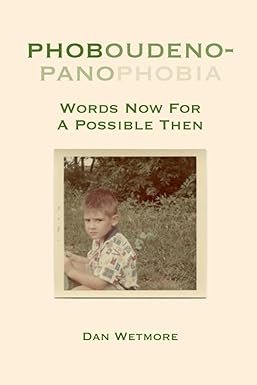MWSA Review
Dan Wetmore has no intention of making things easy for the readers of his book of poetry, inexplicably (until page 36) named Phoboudenopanophobia. He warns that he intends to “play with words and make origami of thoughts and musings.” He might have attached a flashing light or wailing siren to this warning. Be prepared for often fruitless internet searches and dictionary lookups as you make your way through this book.
In other words, reading Wetmore's work is a demanding process. You'll often catch glimpses of meaning and understand his intent. But just as frequently, even after several read-throughs, you might find yourself accepting that Wetmore has invited you to continue pondering his words rather than providing a readily decipherable Rosetta Stone for each poem.
There’s nothing airy or easy about this book. Wetmore employs words as tools to grapple with many serious subjects, including Alzheimer’s, death, drowning, perception, claustrophobia, torture, and more. If you’re looking for a feel-good book of poetry, Phoboudenopanophobia isn’t for you. On the other hand, if you’re game for a challenging mental workout, you might want to give this one a try.
Review by John Cathcart (April 2024)
Author's Synopsis
Penning a previous book, My Mother’s Gentle Unbecoming, about her descent into dementia, got me contemplating a similar fate, so I wrote this volume as an extended last letter to my family, sort of an “epitaph in absentia”; hoped insurance against having last feelings go unexpressed, in the event the body outlives the being. An exploration of the emotional toll taken on the leaving and the left behind, the title is a braid of the three fears which predominate: fear of having nothing (Oudenophobia); fear—at a point when all is unknown (and the unknown is easily alarming)—of everything (Panophobia); and, as the product of those two, a fear of being reduced to a constant state of dread, i.e., fear itself (Phobophobia).
Format(s) for review: Paper Only
Review Genre: Poetry—Poetry Book
Number of Pages: 75
Word Count: 8,000

